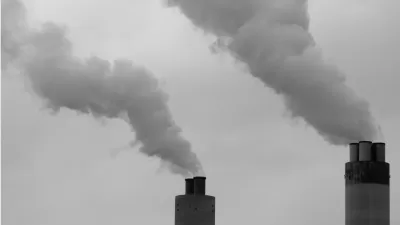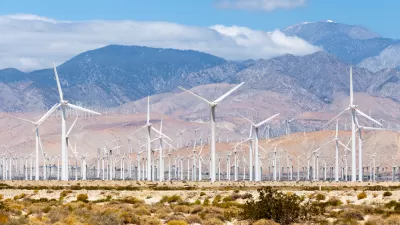A new report attributes a 9% decrease in greenhouse gas emissions from the nation's power plants in 2009 to the relatively cheap price of generating electricity from natural gas versus coal.
While the economic recession is credited with a nationwide decrease in greenhouse gas emissions of nearly 7% in 2009, a new report, published in the journal Environmental Science & Technology, provides a different explanation for the decrease found in the electricity generation sector.
"A Harvard University release reports that in the United States, the power sector is responsible for 40 percent of all carbon emissions. In 2009, CO2 emissions from power generation dropped by 8.76 percent. Harvard researchers attribute that change to the new abundance of cheap natural gas."
"Generating 1 kilowatt-hour of electricity from coal releases twice as much CO2 to the atmosphere as generating the same amount from natural gas, so a slight shift in the relative prices of coal and natural gas can result in a sharp drop in carbon emissions," explains Michael B. McElroy, Gilbert Butler Professor of Environmental Studies at Harvard School of Engineering and Applied Sciences, who led the study. "That's what we saw in 2009," he says, "and we may well see it again."
E&E did report one warning included in the study, and a recommendation from the lead researcher to address it:
"...although the abundance of natural gas is lowering U.S. greenhouse gas emissions today, McElroy said the glut of gas could make it harder for America to continue to cut its global warming pollution.
"Long term, it's not good news," he said. "It's going to make gas much more competitive than renewable energy."
"To help make wind, solar and other renewable sources of electricity more competitive, the Harvard study recommended that the federal government impose a carbon tax of $5 per ton of carbon dioxide. The report said that fee would increase electricity prices by 0.3 cents per kilowatt and contribute $12 billion in revenue to the federal treasury."
Thanks to E&E Publishing- EnergyWire
FULL STORY: Cheaper natural gas leads to reduced U.S. carbon emissions

Planetizen Federal Action Tracker
A weekly monitor of how Trump’s orders and actions are impacting planners and planning in America.

Restaurant Patios Were a Pandemic Win — Why Were They so Hard to Keep?
Social distancing requirements and changes in travel patterns prompted cities to pilot new uses for street and sidewalk space. Then it got complicated.

Map: Where Senate Republicans Want to Sell Your Public Lands
For public land advocates, the Senate Republicans’ proposal to sell millions of acres of public land in the West is “the biggest fight of their careers.”

Maui's Vacation Rental Debate Turns Ugly
Verbal attacks, misinformation campaigns and fistfights plague a high-stakes debate to convert thousands of vacation rentals into long-term housing.

San Francisco Suspends Traffic Calming Amidst Record Deaths
Citing “a challenging fiscal landscape,” the city will cease the program on the heels of 42 traffic deaths, including 24 pedestrians.

California Homeless Arrests, Citations Spike After Ruling
An investigation reveals that anti-homeless actions increased up to 500% after Grants Pass v. Johnson — even in cities claiming no policy change.
Urban Design for Planners 1: Software Tools
This six-course series explores essential urban design concepts using open source software and equips planners with the tools they need to participate fully in the urban design process.
Planning for Universal Design
Learn the tools for implementing Universal Design in planning regulations.
Heyer Gruel & Associates PA
JM Goldson LLC
Custer County Colorado
City of Camden Redevelopment Agency
City of Astoria
Transportation Research & Education Center (TREC) at Portland State University
Camden Redevelopment Agency
City of Claremont
Municipality of Princeton (NJ)




























